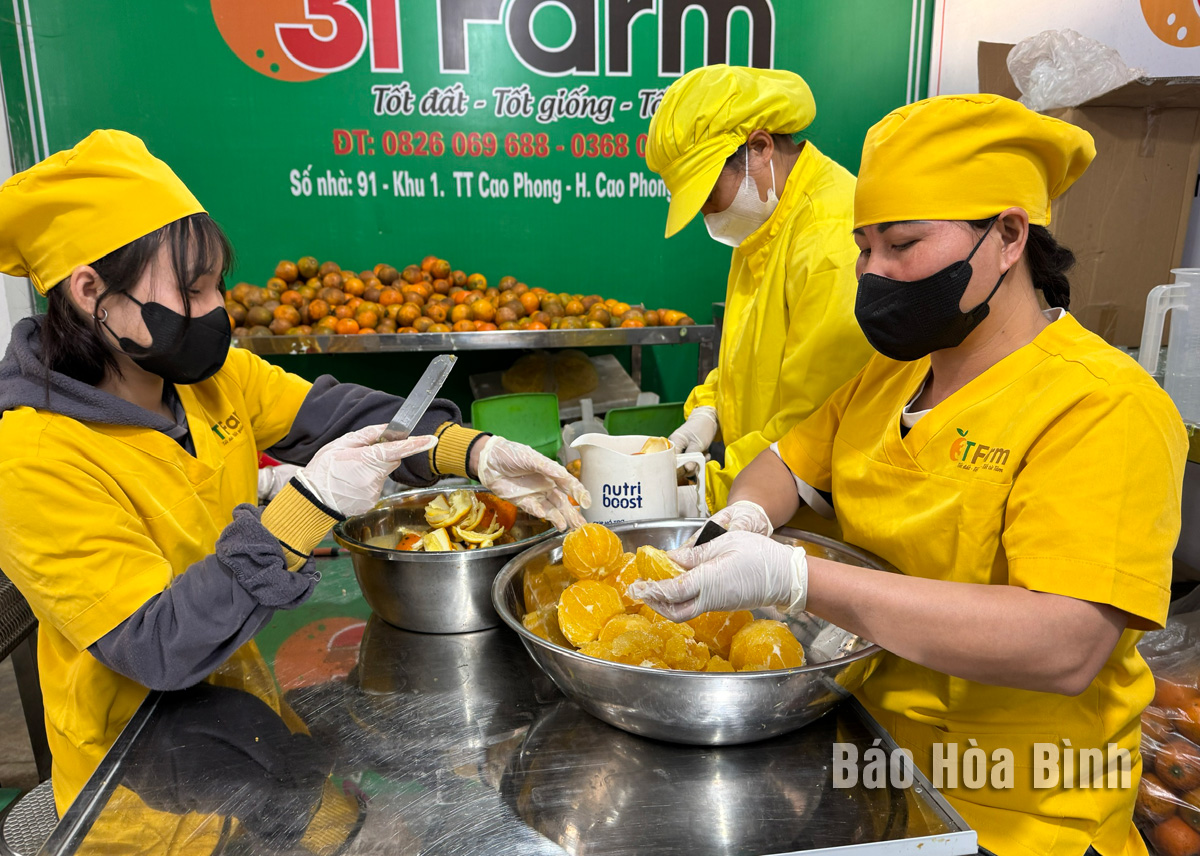
Along with cultivation following good agricultural practices, the 3T Cao Phong Agricultural Cooperative (3T Farm), located in Cao Phong town, Cao Phong district, focuses on researching and applying scientific techniques to produce processed products from fresh oranges. This not only helps diversify products but also promotes sustainable consumption while maximising the value of the fresh oranges grown in Cao Phong.
Fresh oranges carefully selected and pre-processed by 3T Farm before being sent
to the marmalade processing machine.
With the goal of maintaining and enhancing the
Cao Phong orange brand, the cooperative has implemented innovative and
appropriate methods such as investing in production and processing
technologies, avoiding the use of chemical fertilisers, and encouraging the use
of organic agricultural materials to produce safe oranges, which are
well-received by consumers. Furthermore, it has actively collaborated with
local businesses and organisations to research and create new products to serve
consumers. To increase value and expand its market reach, the cooperative has
developed a specific production plan for processed products, with the first
goal of creating products that meet the provincial OCOP (one commune, one
product) standard.
With the support of local authorities,
specialised units, and experts from Cao Phong district, the cooperative
continues to improve the quality, design, and packaging of its processed
products in preparation for the OCOP certification. Vu Thi Le Thuy, Director of
3T Farm, shared that in 2024, its detox tea was recognised as an OCOP 3-star
product at the district level. Recently, this product was evaluated and
recognised by the Council for the OCOP Programme as meeting the 4-star OCOP
standard at the provincial level in 2024.
Continuing its journey to build an organic
orange brand, 3T Farm persistently improves techniques, and invests in
equipment, machinery, and technology to introduce new processed products made
from Cao Phong oranges. With the benefits for consumers’ health, 3T Farm hopes
that after their market debut, the products will get support from the public,
especially women.
Dao Village’s honey – a product certified with a 3-star OCOP (One Commune One Product) rating by Thong Nhat Agricultural Cooperative in Dao Village (Hoa Binh City) – is highly regarded by consumers for its quality, richness, and variety in packaging. The distinctively sweet taste of Dao Village’s honey leaves a lasting impression on anyone who has tried it.
In alignment with Project No. 07-DA/TU, issued by the Hoa Binh provincial Party Committee on November 1, 2021, Lac Thuy district has actively promoted investment and supported the sustainable development of its industrial and handicraft sectors during the 2021–2025 period. Alongside this, the district has remained committed to preserving and revitalising traditional craft villages.
Located in the northern part of Lac Thuy district, with a temperate climate and fertile soil, Phu Thanh commune has great potential and advantages in growing tea. The long-standing experience, combined with strict adherence to organic farming practices in the tea gardens, ensures that the dried tea products from Phu Thanh and Lac Thuy as a whole are sold out immediately upon production, providing a stable and prosperous life for the local people.
Amid efforts to streamline the administrative apparatus, Hoa Binh province has intensified measures to address challenges in land clearance, resettlement support, and infrastructure investment, aiming to speed up the progress of key projects.
Hoa Binh province has posted an unprecedented economic growth rate of 12.76% in the first quarter of 2025, marking its highest quarterly performance to date and positioning it as the second fastest-growing locality in the country, trailing only Bac Giang province.
Under current regulations, products in the One Commune – One Product (OCOP) programme that are rated three stars or higher must undergo re-evaluation every three months. However, in reality, some of these products fail to consistently meet the required standards, raising concerns about the sustainability of their OCOP certification. This underscores the urgent need for producers to enhance product quality and gradually develop their OCOP products into strong, marketable brands.



